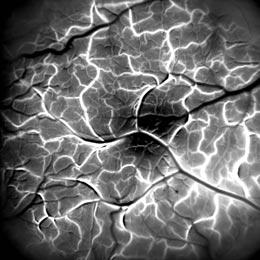 Blood vessel activation in the brain. The dark central area is the response to a visual stimulus.Y. Sirotin & A. Das
Blood vessel activation in the brain. The dark central area is the response to a visual stimulus.Y. Sirotin & A. DasPosted on 01/22/2009 3:50:57 AM PST by neverdem
Anticipatory brain mechanism may be complicating MRI studies.
 Blood vessel activation in the brain. The dark central area is the response to a visual stimulus.Y. Sirotin & A. Das
Blood vessel activation in the brain. The dark central area is the response to a visual stimulus.Y. Sirotin & A. DasPopular brain-imaging techniques may be painting a misleading picture of brain activity, according to a new study.
Scientists using techniques such as functional magnetic resonance imaging (fMRI) make the assumption that blood flow into a particular brain region is directly linked to the amount of activity in the cells of that region. This is because active cells need more oxygen, and blood ferries it to them.
But a study by Aniruddha Das and Yevgeniy Sirotin at Columbia University in New York shows that this is not necessarily the case. The two found an increase in blood flow in the visual cortices of monkeys when the animals looked at a dot on a screen — but also when they were simply expecting the dot to appear1.
"It could imply a hitherto unknown mechanism of brain arousal or preparedness," says Das. "That makes us pause in thinking about how fMRI signals have to be interpreted."
Das and Sirotin used an optical-imaging technique to measure the amount of oxygen in the blood and the rate of blood flow separately in the monkeys' visual cortices. They then compared the results with measurements of brain activity taken with electrodes inserted in the same area.
The electrode and blood measurements coincided when the monkeys were looking at a dot, as expected. But when they were expecting to see something, and nothing actually appeared, there was an increase in the flow of oxygen-rich blood to the visual cortex without a corresponding electrode signal.
"What caught us completely by surprise was that there was this huge anticipatory signal which appeared prior to us showing the visual stimulus," Das says. The purpose of this could be to supply cortical arteries in the visual region in time for the upcoming stimulus, he says.
ADVERTISEMENT
The findings suggest that scientists who use fMRI may need to interpret their data differently, concludes neuroscientist David Leopold at the National Institute of Mental Health in Bethesda, Maryland2. Most fMRI experiments with human subjects involve presenting visual stimuli at intervals and rely on lining up the blood flow in time with the stimuli, Leopold explains. But, he adds, the mismatch between neural activity and blood flow demonstrated in the paper is "extreme".
It should be possible to design experiments that are not confounded by the extra signal, says Das. But, he warns, "what our work suggests is that what people interpret as attention in functional MRI may not reflect local changes in neuronal activity."
Carly Simon anticipated this.
Precognition? I knew I was going to say that.........
This finding could potentially obviate the saying, “Monkey see, monkey do”
Then again, other forms of anticipatory stimulation actually take blood AWAY from the brain...
Fascinating, but then not really surprising.
“Anticipation” must itself be a function of the brain, and the brain would obviously have some sort of measurable activity associated with anticipation.
I wonder if the writers of House will think to stick this into a program soon — it would make a very cool part of a story line.
Harvard Makes Topical RNAi Treatment That Can Effectively Stop the Transmission of Herpes
FReepmail me if you want on or off my health and science ping list.
Discussions on "ghost in the machine" and all that.
Cheers!
Disclaimer: Opinions posted on Free Republic are those of the individual posters and do not necessarily represent the opinion of Free Republic or its management. All materials posted herein are protected by copyright law and the exemption for fair use of copyrighted works.